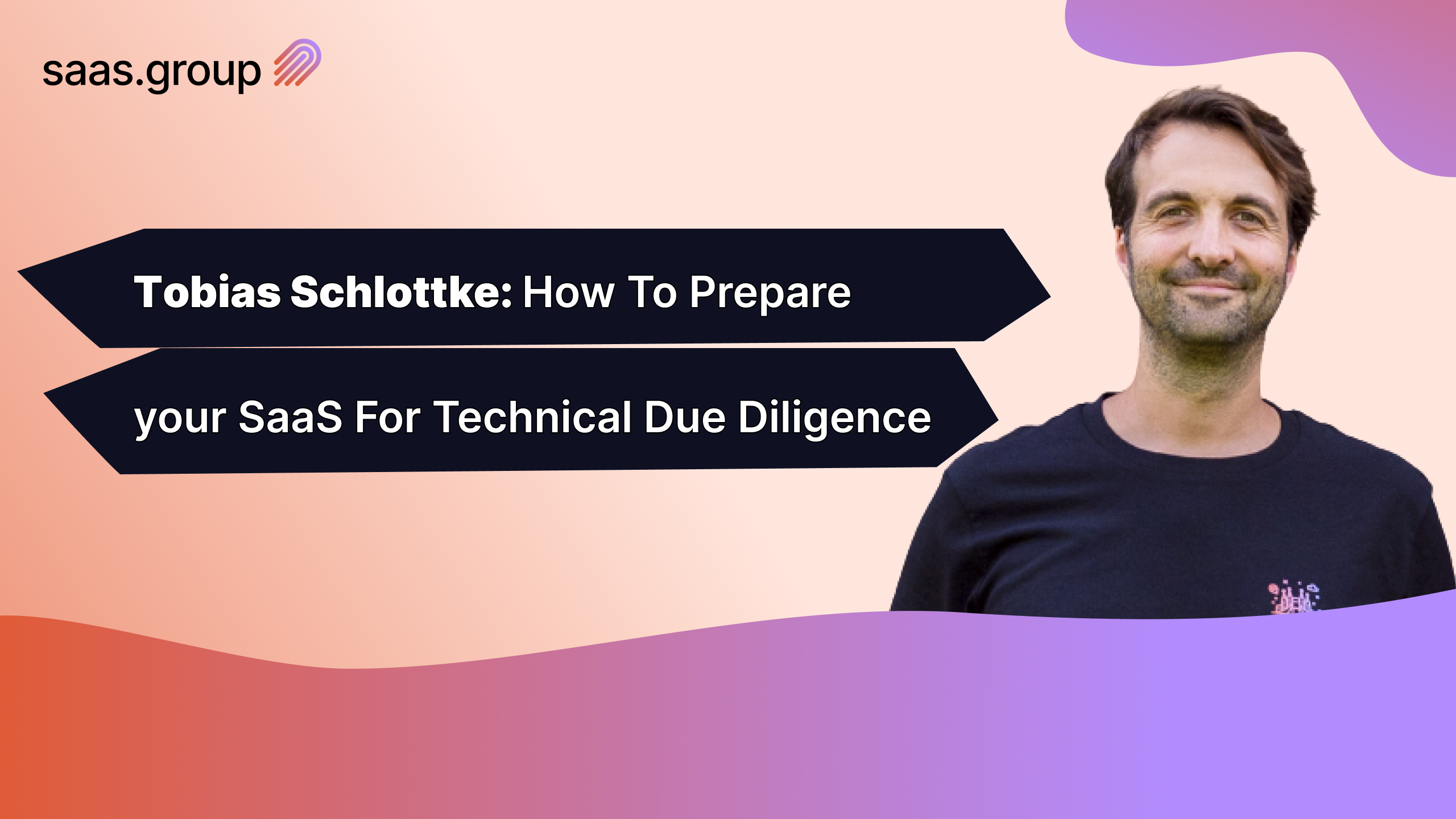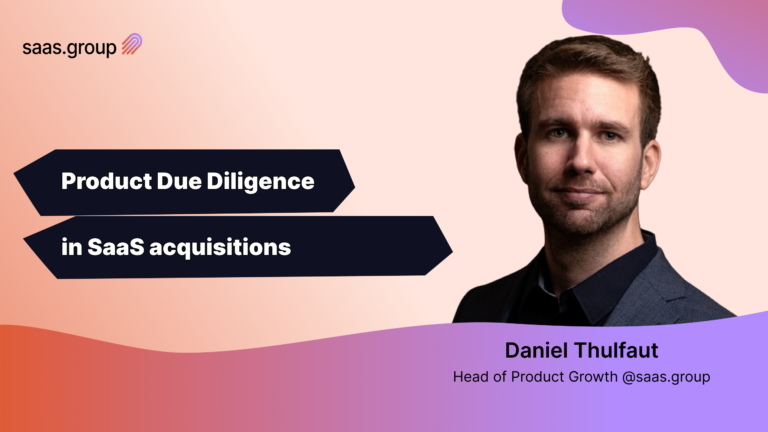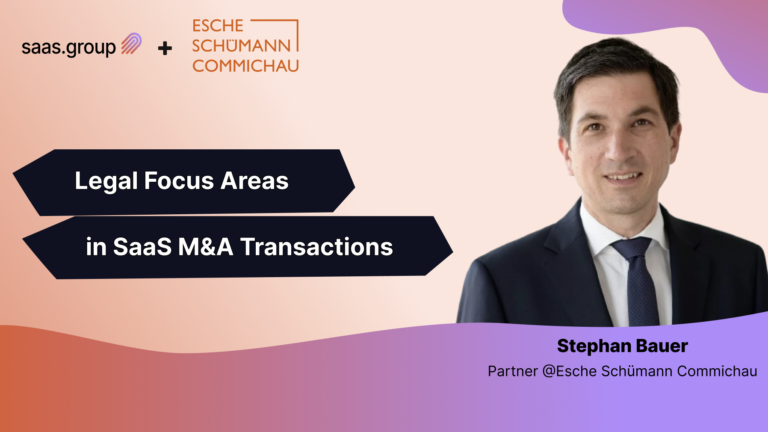Technical due diligence is often something founders are confused about. They rarely know what to expect and how to present their challenges during the process.
This is exactly what we discussed with Tobias Schlottke, co-founder and CTO of saas.group to bring more transparency and clarity to technical due diligence for B2B SaaS founders.
- Can you introduce yourself and talk about the way you joined saas.group?
I’m one of the co-founders of OMR Conference in Hamburg, as well as a CTO community called alphalist, but saas.group is my main focus right now. I’ve been a founder for more than 10 years now and have sold one company to Bertelsmann and one company to Zalando. I have a tech background, so I still love coding and I still love building SaaS products, and that’s exactly why I joined Tim Schumacher and Ulrich Essmann on the mission to become the world’s biggest SaaS conglomerate.
At first, I joined as an early investor and then quickly became a co-founder and partner. I cover mostly the technical side. I love working with digital products and product companies. And that’s exactly what I do every day.
- What is saas.group’s new vision?
The new vision is that we want to become the biggest SaaS conglomerate in the world.
I think it’s doable, and we’re on a good track.
We have now acquired 17 different companies, and we’re quite happy with the progress.
We have a lot of amazing people on board, and they really do a great job, providing a lot of central support with all the central functions that we built in saas.group to support the companies we acquired.
My personal vision is to build a huge knowledge hub. We all want to learn, and we all want to become better at what we do, and I think that is where saas.group could help. The most exciting goal for me is to really provide valuable input on all the different topics that, as a SaaS founder, you often struggle with, like pricing, finance, and all the “boring” stuff that founders don’t necessarily want to deal with.
To help our brands with that, we have recently even started to bring together an AI team. It’s a huge trend we don’t want to miss, and we see many SaaS companies adopting it. Our mission is to be valuable and helpful whenever we acquire a new company, and even before that.
- You oversee the technical due diligence. When does it start in the whole due diligence process? And what are founders usually afraid of when it comes to it?
First, as a founder, you talk to our M&A team. Then, when we’re sure that it will come to a deal, we sign the letter of intent (LOI), and that is a handshake agreement that we are serious about acquiring you.
At this point, we define the overall terms and the price of the deal. Things like how long the founder will stay with us, how long the earnout will be, and other conditions.
Then, we look deeper into the intellectual property that was created.
That is what I do with the team, and partly with external consultants. We look at the product and roadmap and talk to the team. We expect to have a deep and honest conversation about going forward and about potential corrections to the deal.
- Do you expect the founders to communicate the deal to their team?
It’s a very company-specific situation. It’s good if people who are involved in building the product are notified. But, naturally, you want to keep that circle pretty small because deals fall through, and you don’t want to confuse your team with that.
- What is the biggest green flag for you?
I would say having a well-defined roadmap, a pitch deck, an architecture diagram, recent security and cost audits, and a well-performing team. It’s the best thing if the team is motivated and really gets work done. I would say it’s a big check mark.
- How do you start technical due diligence?
Before the technical due diligence, we look at whatever is provided, like the tech stack, the cloud that is being used, etc. To get a better feeling for what is there and how good the fit is. It’s about finding valuable information and having an outside perspective on your business and on your technical stack as well, to pave the road forward.
We typically start with a kickoff meeting where we ask for all the materials that we need. We send a question list to go through. Then founders end up with a big list of questions where we pinpoint the topics where we want to have follow-up conversations. Then we do interviews with the teams. We look at the source code, obviously. So, I would say the better prepared you are for a source code audit, the better it is. So make sure you don’t have credentials in code, big smells in terms of wrongly formatted stuff, and missing documentation. Try to prepare as much as possible for the process to avoid going back and forth.
- What are the smells and anti-patterns you watch out for?
There are obviously things you could do wrong that we spot early, and we want to see as little as possible.
The biggest smell from my perspective is a lack of business understanding in the tech team and a non-alignment with the business team. That’s what you find in many companies, unfortunately, especially if the company grows, and it’s a really bad sign. So the better you are aligned, the better it is.
A couple more things are micromanaging, lack of delegation, and failure to choose the right tools to use within the company. Not the best things to encounter, but nothing unsolvable, either.
- If you could give one piece of advice to founders on how to prepare for technical due diligence, what would it be?
One thing that every founder should really be aware of is clarity regarding intellectual property. Does your software really belong to you? Founders tend to dislike contractual work, but regardless of how mundane the task is, it’s crucial.
Whenever you hire a freelancer, make sure you have proper contracts. Not having those would be a big red flag that would turn away almost every buyer.
Otherwise, if the freelancer realizes that you’re selling and they are no longer with the company but have some sort of access to the source code, you could end up in legal trouble. Make sure whatever is produced at work belongs to you and you have a proper contract to prove it.
- Do you have a hack for technical due diligence that helps you identify good and bad cases?
The simplest thing to do is check GitHub. I look at statistics. Who’s contributing what and how much? In many companies, the founder is the one contributing the most, and it’s already a yellow flag because, in most cases, they walk away.
So the easiest thing to do is to just check that and create awareness of how involved the founder is in the day-to-day work of the product.
Overall, the narrative that we’re trying to push is that we’re looking for transparency in every part of the sales and due diligence process. We are ready to have an honest conversation and expect founders to do the same.
If we know about the challenges and potential problems beforehand, we have a fair advantage to act on them and fix everything with the founder. Hiding things like that can not only harm the deal but also jeopardize the relationship with your acquirer. No matter how short your earnout period is, you don’t want to do that. Be prepared to work together, and I’m sure anything can be fixed for a good deal.
If you want to discuss technical due diligence more in-depth or even talk about a potential acquisition of your company by saas.group, you can reach out to me directly on LinkedIn or via email at [email protected].
Table of Contents
Weekly newsletter
No spam. Just the latest news and articles from the world of SaaS and Acquisitions.




